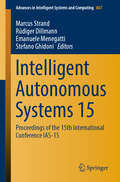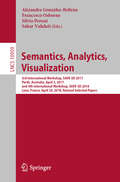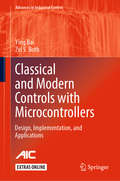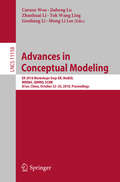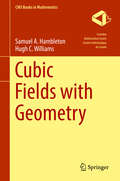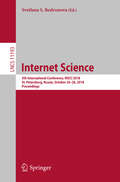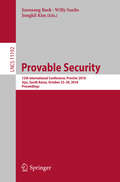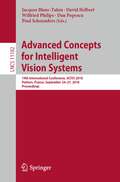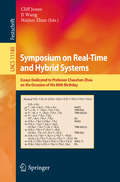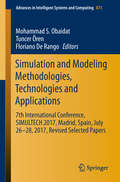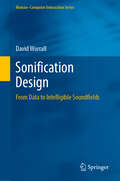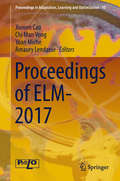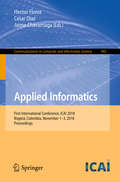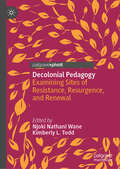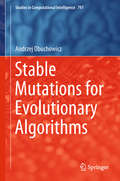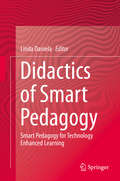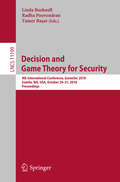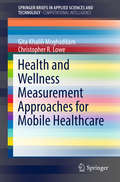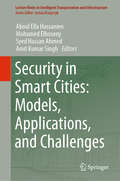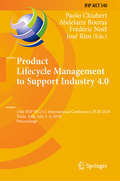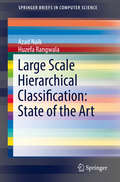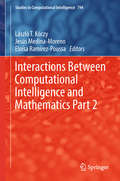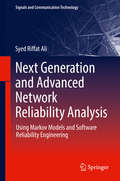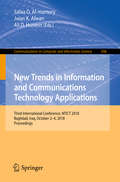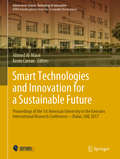- Table View
- List View
Intelligent Autonomous Systems 15: Proceedings of the 15th International Conference IAS-15 (Advances in Intelligent Systems and Computing #867)
by Marcus Strand Rüdiger Dillmann Emanuele Menegatti Stefano GhidoniThis book presents the latest advances and research achievements in the fields of autonomous robots and intelligent systems, presented at the IAS-15 conference, held in Baden-Baden, Germany, in June 2018. It brings together contributions from researchers, engineers and practitioners from all over the world on the main trends of robotics: navigation, path planning, robot vision, human detection, and robot design – as well as a wide range of applications. This installment of the conference reflects the rise of machine learning and deep learning in the robotics field, as employed in a variety of applications and systems. All contributions were selected using a rigorous peer-review process to ensure their scientific quality. The series of biennial IAS conferences was started in 1986: since then, it has become an essential venue for the robotics community.
Semantics, Analytics, Visualization: 3rd International Workshop, Save-sd 2017, Perth, Australia, April 3, 2017, And 4th International Workshop, Save-sd 2018, Lyon, France, April 24, 2018, Revised Selected Papers (Lecture Notes in Computer Science #10959)
by Sahar Vahdati Silvio Peroni Francesco Osborne Alejandra González-BeltránThis book constitutes the refereed proceedings of the 3rd International Workshop, SAVE-SD 2017, held in Perth, Australia, in April 2017, and the 4th International Workshop, SAVE-SD 2018, held in Lyon, France, in April 2018. The 6 full, 2 position and 4 short papers were selected from 16 submissions. The papers describe multiple ways in which scholarly dissemination can be approved: Creating structured data, providing methods for semantic computational analysis and designing systems for navigating. This allows a variety of stakeholders to understand research dynamics, predict trends and evaluate the quality of research.
Classical and Modern Controls with Microcontrollers: Design, Implementation And Applications (Advances in Industrial Control)
by Ying Bai Zvi S. RothThis book focuses on the design, implementation and applications of embedded systems and advanced industrial controls with microcontrollers. It combines classical and modern control theories as well as practical control programming codes to help readers learn control techniques easily and effectively. The book covers both linear and nonlinear control techniques to help readers understand modern control strategies. The author provides a detailed description of the practical considerations and applications in linear and nonlinear control systems. They concentrate on the ARM® Cortex®-M4 MCU system built by Texas Instruments™ called TM4C123GXL, in which two ARM® Cortex®-M4 MCUs, TM4C123GH6PM, are utilized. In order to help the reader develop and build application control software for a specified microcontroller unit. Readers can quickly develop and build their applications by using sample project codes provided in the book to access specified peripherals. The book enables readers to transfer from one interfacing protocol to another, even if they only have basic and fundamental understanding and basic knowledge of one interfacing function. Classical and Modern Controls with Microcontrollers is a powerful source of information for control and systems engineers looking to expand their programming knowledge of C, and of applications of embedded systems with microcontrollers. The book is a textbook for college students majored in CE, EE and ISE to learn and study classical and modern control technologies. The book can also be adopted as a reference book for professional programmers working in modern control fields or related to intelligent controls and embedded computing and applications. Advances in Industrial Control reports and encourages the transfer of technology in control engineering. The rapid development of control technology has an impact on all areas of the control discipline. The series offers an opportunity for researchers to present an extended exposition of new work in all aspects of industrial control.
Advances in Conceptual Modeling: ER 2018 Workshops Emp-ER, MoBiD, MREBA, QMMQ, SCME, Xi’an, China, October 22-25, 2018, Proceedings (Lecture Notes in Computer Science #11158)
by Carson Woo Jiaheng Lu Zhanhuai Li Tok Wang Ling Guoliang Li Mong Li LeeThis book constitutes the refereed proceedings of five workshops symposia, held at the 37th International Conference on Conceptual Modeling, ER 2018, in Xi’an, China, in October 2018. The 42 papers promote and disseminate research on theories of concepts underlying conceptual modeling, methods and tools for developing and communicating conceptual models, techniques for transforming conceptual models into effective implementations, and the impact of conceptual modeling techniques on databases, business strategies and information systems. The following workshops are included in this volume: Emp-ER: Empirical Methods in Conceptual Modeling, MoBiD: Modeling and Management of Big Data, MREBA: Conceptual Modeling in Requirements and Business Analysis, QMMQ: Quality of Models and Models of Quality, SCME: Conceptual Modeling Education.
Cubic Fields with Geometry (CMS Books in Mathematics)
by Samuel A. Hambleton Hugh C. WilliamsThe objective of this book is to provide tools for solving problems which involve cubic number fields. Many such problems can be considered geometrically; both in terms of the geometry of numbers and geometry of the associated cubic Diophantine equations that are similar in many ways to the Pell equation. With over 50 geometric diagrams, this book includes illustrations of many of these topics. The book may be thought of as a companion reference for those students of algebraic number theory who wish to find more examples, a collection of recent research results on cubic fields, an easy-to-understand source for learning about Voronoi’s unit algorithm and several classical results which are still relevant to the field, and a book which helps bridge a gap in understanding connections between algebraic geometry and number theory.The exposition includes numerous discussions on calculating with cubic fields including simple continued fractions of cubic irrational numbers, arithmetic using integer matrices, ideal class group computations, lattices over cubic fields, construction of cubic fields with a given discriminant, the search for elements of norm 1 of a cubic field with rational parametrization, and Voronoi's algorithm for finding a system of fundamental units. Throughout, the discussions are framed in terms of a binary cubic form that may be used to describe a given cubic field. This unifies the chapters of this book despite the diversity of their number theoretic topics.
Internet Science: 5th International Conference, INSCI 2018, St. Petersburg, Russia, October 24–26, 2018, Proceedings (Lecture Notes in Computer Science #11193)
by Svetlana S. BodrunovaThis book constitutes the proceedings of the 5th International Conference on Internet Science held in St. Petersburg, Russia, in October 2018. The 23 papers presented were carefully reviewed and selected for inclusion in this volume. They were organized in topical sections named: risks on the Internet: detecting harmful content and discussing regulation; methodologies for studies of online audiences; and online media and public issues.
Provable Security: 12th International Conference, ProvSec 2018, Jeju, South Korea, October 25-28, 2018, Proceedings (Lecture Notes in Computer Science #11192)
by Joonsang Baek Willy Susilo Jongkil KimThis book constitutes the refereed proceedings of the 12th International Conference on Provable Security, ProvSec 2018, held in Jeju, South Korea, in October 2018. The 21 full and 4 short papers presented were carefully reviewed and selected from 48 submissions. The papers are grouped in topical sections on foundation. Public key encryption, digital signature, symmetric key cryptography, and applications.
Advanced Concepts for Intelligent Vision Systems: 19th International Conference, ACIVS 2018, Poitiers, France, September 24–27, 2018, Proceedings (Lecture Notes in Computer Science #11182)
by Jacques Blanc-Talon David Helbert Wilfried Philips Dan Popescu Paul ScheundersThis book constitutes the refereed proceedings of the 19th International Conference on Advanced Concepts for Intelligent Vision Systems, ACIVS 2018, held in Poitiers, France, in September 2018. The 52 full papers presented in this volume were carefully reviewed and selected from 91 submissions. They were organized in topical sections named: video analysis; segmentation and classification; remote sending; biometrics; deep learning; coding and compression; and image restauration and reconstruction.
Symposium on Real-Time and Hybrid Systems: Essays Dedicated to Professor Chaochen Zhou on the Occasion of His 80th Birthday (Lecture Notes in Computer Science #11180)
by Cliff Jones Ji Wang Naijun ZhanThis volume is published in honor of Professor Chaochen Zhou’s 80th birthday. The Festschrift contains 13 refereed papers by leading researchers who were among the participants of the celebratory conference in Changsha, China that took place in October 2017. The papers cover a broad spectrum of subjects related to Formal Methods for the development of computer systems. Topics include Probabilistic Programming, Concurrency, Quantum Computing, Domain Engineering, Real-time and Hybrid Systems, and Cloud Computing. Chaochen Zhou is internationally recognized for his own contributions and for the wide influence that he has had through his appointments in Oxford (UK) where he collaborated with Professor Tony Hoare, Lyngby (Denmark) where he worked with Professor Dines Bjørner, UNU-IIST (Macau) where he moved from being Principal Research Fellow to his appointed as Director of the Institute, as well as in Beijing. His book on the Duration Calculus (joint with Michael Hansen) made a seminal contribution to specifying and reasoning about real-time systems. Chaochen Zhou’s contributions have been marked by his election as a member of the Chinese Academy of Sciences.
Simulation and Modeling Methodologies, Technologies and Applications: 7th International Conference, SIMULTECH 2017 Madrid, Spain, July 26–28, 2017 Revised Selected Papers (Advances in Intelligent Systems and Computing #873)
by Mohammad S. Obaidat Tuncer Ören Floriano De RangoThis book highlights a set of selected, revised and extended papers from the 7th International Conference on Simulation and Modeling Methodologies, Technologies and Applications (SIMULTECH 2017), held in Madrid, Spain, on July 26 to 28, 2017. The conference brought together researchers, engineers and practitioners whose work involves methodologies in and applications of modeling and simulation. The papers showcased here represent the very best papers from the Conference, and report on a broad range of new and innovative solutions.
Sonification Design: From Data to Intelligible Soundfields (Human–Computer Interaction Series)
by David WorrallThe contemporary design practice known as data sonification allows us to experience information in data by listening. In doing so, we understand the source of the data in ways that support, and in some cases surpass, our ability to do so visually. In order to assist us in negotiating our environments, our senses have evolved differently. Our hearing affords us unparalleled temporal and locational precision. Biological survival has determined that the ears lead the eyes. For all moving creatures, in situations where sight is obscured, spatial auditory clarity plays a vital survival role in determining both from where the predator is approaching or to where the prey has escaped. So, when designing methods that enable listeners to extract information from data, both with and without visual support, different approaches are necessary. A scholarly yet approachable work by one of the recognized leaders in the field of auditory design, this book will - Lead you through some salient historical examples of how non-speech sounds have been used to inform and control people since ancient times. - Comprehensively summarize the contemporary practice of Data Sonification. - Provide a detailed overview of what information is and how our auditory perceptions can be used to enhance our knowledge of the source of data. - Show the importance of the dynamic relationships between hearing, cognitive load, comprehension, embodied knowledge and perceptual truth. - Discuss the role of aesthetics in the dynamic interplay between listenability and clarity. - Provide a mature software framework that supports the practice of data sonification design, together with a detailed discussion of some of the design principles used in various examples. David Worrall is an internationally recognized composer, sound artist and interdisciplinary researcher in the field of auditory design. He is Professor of Audio Arts and Acoustics at Columbia College Chicago and a former elected president of the International Community for Auditory Display (ICAD), the leading organization in the field since its inception over 25 years ago.Code and audio examples for this book are available athttps://github.com/david-worrall/springer/ Here is an excellent review of the book by Dr Gregory Kramer: “Worrall proceeds bravely through the trees and vines of philosophy, information theory, aesthetics, and other contributors to sonification design theory. It’s a feat. He nails all of this down with the specific implementation system he’s designed over many years, and applies his theories to specific problems. In a field of research still in its first half century and setting its bearings in a world where human perception has become a sideshow to machine learning, deep learning, and artificial intelligence, the roots David provides will serve well.” Dr Gregory Kramer is the founding figure in the emerging field of sonification, founded the International Conference on Auditory Display (ICAD) and editor of the first book in the field, "Auditory Display: Sonification, Audification and Auditory Interfaces" (Addison Wesley, 1994).
Proceedings of ELM-2017 (Proceedings in Adaptation, Learning and Optimization #10)
by Jiuwen Cao Chi Man Vong Yoan Miche Amaury LendasseThis book contains some selected papers from the International Conference on Extreme Learning Machine (ELM) 2017, held in Yantai, China, October 4–7, 2017. The book covers theories, algorithms and applications of ELM.Extreme Learning Machines (ELM) aims to enable pervasive learning and pervasive intelligence. As advocated by ELM theories, it is exciting to see the convergence of machine learning and biological learning from the long-term point of view. ELM may be one of the fundamental `learning particles’ filling the gaps between machine learning and biological learning (of which activation functions are even unknown). ELM represents a suite of (machine and biological) learning techniques in which hidden neurons need not be tuned: inherited from their ancestors or randomly generated. ELM learning theories show that effective learning algorithms can be derived based on randomly generated hidden neurons (biological neurons, artificial neurons, wavelets, Fourier series, etc) as long as they are nonlinear piecewise continuous, independent of training data and application environments. Increasingly, evidence from neuroscience suggests that similar principles apply in biological learning systems. ELM theories and algorithms argue that “random hidden neurons” capture an essential aspect of biological learning mechanisms as well as the intuitive sense that the efficiency of biological learning need not rely on computing power of neurons. ELM theories thus hint at possible reasons why the brain is more intelligent and effective than current computers. This conference will provide a forum for academics, researchers and engineers to share and exchange R&D experience on both theoretical studies and practical applications of the ELM technique and brain learning. It gives readers a glance of the most recent advances of ELM.
Applied Informatics: First International Conference, ICAI 2018, Bogotá, Colombia, November 1-3, 2018, Proceedings (Communications in Computer and Information Science #942)
by Hector Florez Cesar Diaz Jaime ChavarriagaThis book constitutes the thoroughly refereed papers of the First International Conference on Applied Informatics, ICAI 2018, held in Bogotá, Colombia, in November 2018. The 27 full papers were carefully reviewed and selected from 81 submissions. The papers are organized in topical sections on data analysis; decision systems; health care information systems; IT architectures; learning management systems; mobile information processing systems; robotic autonomy; software design engineering.
Decolonial Pedagogy: Examining Sites of Resistance, Resurgence, and Renewal
by Njoki Nathani Wane Kimberly L. ToddThrough innovative and critical research, this anthology inquires and challenges issues of race and positionality, empirical sciences, colonial education models, and indigenous knowledges. Chapter authors from diverse backgrounds present empirical explorations that examine how decolonial work and Indigenous knowledges disrupt, problematize, challenge, and transform ongoing colonial oppression and colonial paradigm. This book utilizes provocative and critical research that takes up issues of race, the shortfalls of empirical sciences, colonial education models, and the need for a resurgence in Indigenous knowledges to usher in a new public sphere. This book is a testament of hope that places decolonization at the heart of our human community.
Stable Mutations for Evolutionary Algorithms (Studies in Computational Intelligence #797)
by Andrzej ObuchowiczThis book presents a set of theoretical and experimental results that describe the features of the wide family of α-stable distributions (the normal distribution also belongs to this class) and their various applications in the mutation operator of evolutionary algorithms based on real-number representation of the individuals, and, above all, equip these algorithms with features that enrich their effectiveness in solving multi-modal, multi-dimensional global optimization problems. The overall conclusion of the research presented is that the appropriate choice of probabilistic model of the mutation operator for an optimization problem is crucial. Mutation is one of the most important operations in stochastic global optimization algorithms in the n-dimensional real space. It determines the method of search space exploration and exploitation. Most applications of these algorithms employ the normal mutation as a mutation operator. This choice is justified by the central limit theorem but is associated with a set of important limitations. Application of α-stable distributions allows more flexible evolutionary models to be obtained than those with the normal distribution. The book presents theoretical analysis and simulation experiments, which were selected and constructed to expose the most important features of the examined mutation techniques based on α-stable distributions. It allows readers to develop a deeper understanding of evolutionary processes with stable mutations and encourages them to apply these techniques to real-world engineering problems.
Didactics of Smart Pedagogy: Smart Pedagogy for Technology Enhanced Learning
by Linda DanielaThe focus on smart education has become a new trend in the global educational field. Some countries have already developed smart education systems and there is increasing pressure coming from business and tech communities to continue this development. Simultaneously, there are only fragmented studies on the didactic aspects of technology usage. Thus, pedagogy as a science must engage in a new research direction—smart pedagogy. This book seeks to engage in a new research direction, that of smart pedagogy. It launches discussions on how to use all sorts of smart education solutions in the context of existing learning theories and on how to apply innovative solutions in order to reduce the marginalization of groups in educational contexts. It also explores transformations of pedagogical science, the role of the educator, applicable teaching methods, learning outcomes, and research and assessment of acquired knowledge in an effort to make the smart education process meaningful to a wide audience of international educators, researchers, and administrators working within and tangential to TEL.
Decision and Game Theory for Security: 9th International Conference, GameSec 2018, Seattle, WA, USA, October 29–31, 2018, Proceedings (Lecture Notes in Computer Science #11199)
by Linda Bushnell Radha Poovendran Tamer BaşarThe 28 revised full papers presented together with 8 short papers were carefully reviewed and selected from 44 submissions.Among the topical areas covered were: use of game theory; control theory; and mechanism design for security and privacy; decision making for cybersecurity and security requirements engineering; security and privacy for the Internet-of-Things; cyber-physical systems; cloud computing; resilient control systems, and critical infrastructure; pricing; economic incentives; security investments, and cyber insurance for dependable and secure systems; risk assessment and security risk management; security and privacy of wireless and mobile communications, including user location privacy; sociotechnological and behavioral approaches to security; deceptive technologies in cybersecurity and privacy; empirical and experimental studies with game, control, or optimization theory-based analysis for security and privacy; and adversarial machine learning and crowdsourcing, and the role of artificial intelligence in system security.
Health and Wellness Measurement Approaches for Mobile Healthcare (SpringerBriefs in Applied Sciences and Technology)
by Gita Khalili Moghaddam Christopher R. LoweThis book reviews existing sensor technologies that are now being coupled with computational intelligence for the remote monitoring of physical activity and ex vivo biosignatures. In today’s frenetic world, consumers are becoming ever more demanding: they want to control every aspect of their lives and look for options specifically tailored to their individual needs. In many cases, suppliers are catering to these new demands; as a result, clothing, food, social media, fitness and banking services are all being democratised to the individual. Healthcare provision has finally caught up to this trend and is currently being rebooted to offer personalised solutions, while simultaneously creating a more effective, scalable and cost-effective system for all. The desire for personalisation, home monitoring and treatment, and provision of care in remote locations or in emerging and impoverished nations that lack a fixed infrastructure, is leading to the realisation that mobile technology might be the best candidate for achieving these goals. A combination of several technological, healthcare and financial factors are driving this trend to create a new healthcare model that stresses preventative ‘health-care’ rather than ‘sick-care’, and a shift from volume to value. Mobile healthcare (mhealth), which could also be termed the “internet of people”, refers to the integration of sensors and smartphones to gather and interpret clinical data from patients in real-time. Most importantly, with an ageing population suffering multiple morbidities, mhealth could provide healthcare solutions to enhance chronically ill patients’ quality of life.
Security in Smart Cities: Models, Applications, and Challenges (Lecture Notes in Intelligent Transportation and Infrastructure)
by Syed Hassan Ahmed Aboul Ella Hassanien Amit Kumar Singh Mohamed ElhosenyThis book offers an essential guide to IoT Security, Smart Cities, IoT Applications, etc. In addition, it presents a structured introduction to the subject of destination marketing and an exhaustive review on the challenges of information security in smart and intelligent applications, especially for IoT and big data contexts. Highlighting the latest research on security in smart cities, it addresses essential models, applications, and challenges.Written in plain and straightforward language, the book offers a self-contained resource for readers with no prior background in the field. Primarily intended for students in Information Security and IoT applications (including smart cities systems and data heterogeneity), it will also greatly benefit academic researchers, IT professionals, policymakers and legislators. It is well suited as a reference book for both undergraduate and graduate courses on information security approaches, the Internet of Things, and real-world intelligent applications.
Product Lifecycle Management to Support Industry 4.0: 15th Ifip Wg 5. 1 International Conference, Plm 2018, Turin, Italy, July 2-4, 2018, Proceedings (IFIP Advances in Information and Communication Technology #540)
by Paolo Chiabert Abdelaziz Bouras Frédéric Noël José RíosThis book constitutes the refereed post-conference proceedings of the 15th IFIP WG 5.1 International Conference on Product Lifecycle Management, PLM 2018, held in Turin, Spain, in July 2018.The 72 revised full papers presented were carefully reviewed and selected from 82 submissions. The papers are organized in the following topical sections: building information modeling; collaborative environments and new product development; PLM for digital factories and cyber physical systems; ontologies and data models; education in the field of industry 4.0; product-service systems and smart products; lean organization for industry 4.0; knowledge management and information sharing; PLM infrastructure and implementation; PLM maturity, implementation and adoption; 3D printing and additive manufacturing; and modular design and products and configuration and change management.
Large Scale Hierarchical Classification: State of the Art (SpringerBriefs in Computer Science)
by Azad Naik Huzefa RangwalaThis SpringerBrief covers the technical material related to large scale hierarchical classification (LSHC). HC is an important machine learning problem that has been researched and explored extensively in the past few years. In this book, the authors provide a comprehensive overview of various state-of-the-art existing methods and algorithms that were developed to solve the HC problem in large scale domains. Several challenges faced by LSHC is discussed in detail such as: 1. High imbalance between classes at different levels of the hierarchy 2. Incorporating relationships during model learning leads to optimization issues 3. Feature selection 4. Scalability due to large number of examples, features and classes 5. Hierarchical inconsistencies 6. Error propagation due to multiple decisions involved in making predictions for top-down methods The brief also demonstrates how multiple hierarchies can be leveraged for improving the HC performance using different Multi-Task Learning (MTL) frameworks. The purpose of this book is two-fold: 1. Help novice researchers/beginners to get up to speed by providing a comprehensive overview of several existing techniques. 2. Provide several research directions that have not yet been explored extensively to advance the research boundaries in HC. New approaches discussed in this book include detailed information corresponding to the hierarchical inconsistencies, multi-task learning and feature selection for HC. Its results are highly competitive with the state-of-the-art approaches in the literature.
Interactions Between Computational Intelligence and Mathematics Part 2
by László T. Kóczy Jesús Medina-Moreno Eloísa Ramírez-PoussaThis book presents recent research in the field of interaction between computational intelligence and mathematics. In the current technological age, we face the challenges of tackling very complex problems – in the usual sense, but also in the mathematical and theoretical computer science sense. However, even the most up-to-date results in mathematics, are unable to provide exact solutions of such problems, and no further technical advances will ever make it possible to find general and exact solutions. Constantly developing technologies (including social technologies) necessitate handling very complex problems. This has led to a search for acceptably “good” or precise solutions, which can be achieved by the combination of traditional mathematical techniques and computational intelligence tools, in order to solve the various problems emerging in many different areas to a satisfactory degree. Important funding programs, such as the European Commission’s current framework programme for research and innovation – Horizon 2020 – are devoted to the development of new instruments to deal with the current challenges. Without doubt, research topics associated with the interactions between computational intelligence and traditional mathematics play a key role. Presenting contributions from engineers, scientists and mathematicians, this book offers a series of novel solutions for meaningful and real-world problems that connect those research areas.
Next Generation and Advanced Network Reliability Analysis: Using Markov Models and Software Reliability Engineering (Signals and Communication Technology)
by Syed Riffat AliThis book covers reliability assessment and prediction of new technologies such as next generation networks that use cloud computing, Network Function Virtualization (NVF), Software Defined Network (SDN), Next Generation Transport, Evolving Wireless Systems, Digital VoIP Telephony, and Reliability Testing techniques specific to Next Generation Networks (NGN). This book introduces the technology to the reader first, followed by advanced reliability techniques applicable to both hardware and software reliability analysis. The book covers methodologies that can predict reliability using component failure rates to system level downtimes. The book’s goal is to familiarize the reader with analytical techniques, tools and methods necessary for analyzing very complex networks using very different technologies. The book lets readers quickly learn technologies behind currently evolving NGN and apply advanced Markov modeling and Software Reliability Engineering (SRE) techniques for assessing their operational reliability.Covers reliability analysis of advanced networks and provides basic mathematical tools and analysis techniques and methodology for reliability and quality assessment;Develops Markov and Software Engineering Models to predict reliability;Covers both hardware and software reliability for next generation technologies.
New Trends in Information and Communications Technology Applications: Third International Conference, NTICT 2018, Baghdad, Iraq, October 2–4, 2018, Proceedings (Communications in Computer and Information Science #938)
by Safaa O. Al-mamory Jwan K. Alwan Ali D. HusseinThis book constitutes the refereed proceedings of the Third International Conference on New Trends in Information and Communications Technology Applications, NTICT 2018, held in Baghdad, Iraq, in October 2018.The 18 papers presented were carefully reviewed and selected from 86 submissions. The papers are organized in topical sections, namely: Computer networks; system and network security; machine learning; intelligent control system; communication applications; computer vision; and e-learning.
Smart Technologies and Innovation for a Sustainable Future: Proceedings of the 1st American University in the Emirates International Research Conference — Dubai, UAE 2017 (Advances in Science, Technology & Innovation)
by Ahmed Al-Masri Kevin CurranThe book presents high-quality research papers presented at the 1st AUE International research conference, AUEIRC 2017, organized by the American University in the Emirates, held on November 15th-16th, 2017 in Dubai. The book is broadly divided into three sections: Media and Smart Cities, Creative Technologies and Innovation, and Security Risks and Strategic Challenges. The areas covered under these sections are cyber-psychology and digital forensics, cloud RAN architecture, networking functions virtualization, e-Governance and IoT semantic interoperability, ERP security, web-based application and problem-solving skills, smart technologies and advertising, smart technologies for smart cities, smart adaptable navigation systems, turbo codes for security key generation, technology advanced student learning and mobile devices, big data security and privacy, multi-channel buffer enabled technique, physiological signal acquisition in electro-oculography, blockchain and donation-based crowdfunding, smart city and framework development approach, news channel and media education, UAE foreign policy, China-GCC relations, diplomacy in the Internet age, intelligent cyber-security strategies, industry securities and strategic challenges, hybrid alliances and corporate security, security and privacy in smart cities, human computer interaction and e-learning solution, complexity of smart cities governance. The papers included in this book present insightful information on the most recent and relevant research, theories and practices in the field, which aim for a sustainable future.
